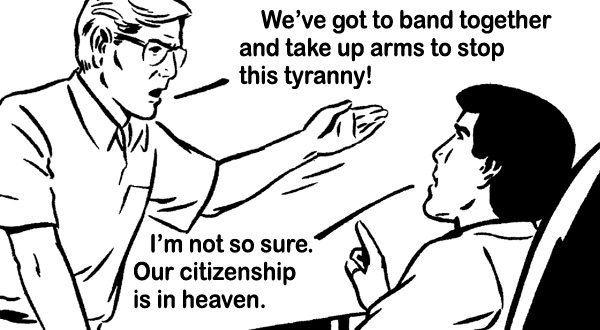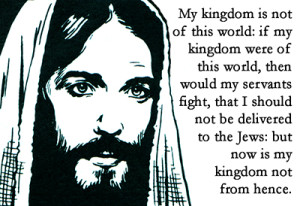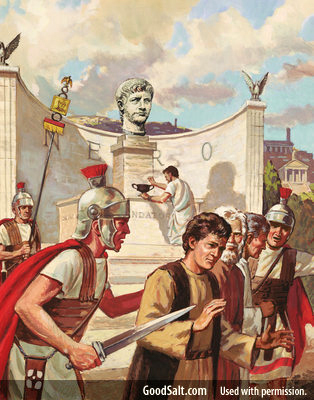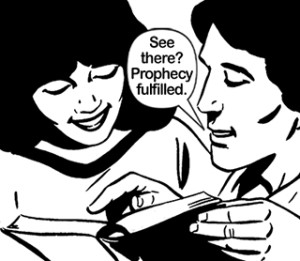 One of the things that has stuck with me the most from the 36 years I spent abroad, serving God, was the need to maintain my relationship with the Lord. One of the mainstays in this, during those years, was having daily devotions.
One of the things that has stuck with me the most from the 36 years I spent abroad, serving God, was the need to maintain my relationship with the Lord. One of the mainstays in this, during those years, was having daily devotions.
There was virtually never a day where I didn’t meet with my fellow workers in the Lord to have a time of morning devotion. This would usually include singing songs, reading some devotional material for maybe 20 or 30 minutes, and then closing with united prayer. It was one of those good habits that helped the day to start off right, to really “acknowledge Him” (Proverbs 3:6) and to try to spend time in His presence, and in unity with the believers.
If you study the history of Christianity and the history of Israel, you can see that this daily time of prayer and devotions, often done unitedly with other believers, has been a constant for literally thousands of years.
Nowadays we don’t have time for that, right? Like some of the Jews said to each other in the time of the kings, “Every man to his tents!” (II Samuel 20:1) Besides, many of us go to church once a week. There we can sing some songs and hear a sermon, sort of have united prayer and then go home. That should do it, shouldn’t it?
For me, it really doesn’t. It’s been close to four years now since I returned from abroad to live here in the States and I’m just not in a situation anymore to have daily morning devotions with others. But I still do it on my own, virtually every day.
This is an essential in my life. I’ve just learned it so clearly over the years that we have to maintain our spiritual life and walk with the Lord. If we want to stay close to the Lord, to hear His voice, to please Him and to have His protection and leading and blessing, we just have to take time to cultivate that relationship with Him, daily.
For me, that means personal devotions every day. It’s not as long as it used to be when I had this time with others. But every day I take some time to read some devotional material. One of the things I read is “Daily Light”, complied by the Samuel Bagster family hundreds of years ago. I read other material like that and then I review my verses for the day. I usually review around 30 verses each day that I have memorized over the years. So many of these are like dear old friends because I can associate the times when I’ve used those verses in my personal life or I remember the event that brought that verse so clearly into my life. I wrote another post about all this in Memorizing God’s Word. This linking up with the Word I’ve memorized has helped to keep God’s Word fresh in my mind and conscious over the years and has been a real key in my life.
I wrote another post about all this in Memorizing God’s Word. This linking up with the Word I’ve memorized has helped to keep God’s Word fresh in my mind and conscious over the years and has been a real key in my life.
Then I go out and take a walk to a nearby park. This is not really for exercise but for me I find that I can pray better when I’m out in nature and sometimes even when I am walking. Also it seems that the Lord’s presence is sometimes closer during those times. Several of the blog posts I have written came from events that actually happened on these walks. “Hawks and Doves” was written from an experience that happened while I was walking down the sidewalk to the park. “Red lights and the Sabbath” was also something that came from walking down the same sidewalk. The idea for this post right here came while I was out for my walk this morning.
And also maybe that’s why I wrote that thing about “Was David a failure?” If there was anybody in the Bible who knew how to maintain, cultivate and grow in his relationship with the Lord, it was King David. That’s why the Psalms are about as good as it gets when it comes to learning how to “draw nigh to God” (James 4:8).
 We’re all so busy. Probably none of you are sitting off on the hillside, tending sheep throughout each day. We’re on line, we’re wired, we’re working overtime, we’re up at 3 AM with the baby, and on and on. But it’s very much like what Jesus said to Martha who was so busy “tending tables” (Acts 6:2). She was upset that her sister, Mary, was not up and busy helping her but she was just idly sitting there listening to Jesus. But then Jesus said to her, “Martha, Martha, you’re worried and troubled about many things. But Mary has chosen the good part that shall not be taken from her.” (Luke 10:41 & 42) And it’s still true today, probably more than ever.
We’re all so busy. Probably none of you are sitting off on the hillside, tending sheep throughout each day. We’re on line, we’re wired, we’re working overtime, we’re up at 3 AM with the baby, and on and on. But it’s very much like what Jesus said to Martha who was so busy “tending tables” (Acts 6:2). She was upset that her sister, Mary, was not up and busy helping her but she was just idly sitting there listening to Jesus. But then Jesus said to her, “Martha, Martha, you’re worried and troubled about many things. But Mary has chosen the good part that shall not be taken from her.” (Luke 10:41 & 42) And it’s still true today, probably more than ever.
I hope, with all you do, that you have time—no, take time—for daily devotion. Without the presence and blessing of God on your life, you’re just going through the motions of faith and you surely won’t have the grace and fruits of the Spirit to survive and thrive as God wants you to do. Have daily devotions!




 This is what I wrote about in “
This is what I wrote about in “ So I’m thinking about writing some articles on some of the things I’ve experienced personally, not stories from centuries ago but things that have happened to me personally, that hopefully will inspire faith in others to know that God is not dead or even sick. I think I’ll call them Angel Stories. Here’s one about an incredible experience I had where angels saved me from death when I pretty much deserved death at that time. It’s called “
So I’m thinking about writing some articles on some of the things I’ve experienced personally, not stories from centuries ago but things that have happened to me personally, that hopefully will inspire faith in others to know that God is not dead or even sick. I think I’ll call them Angel Stories. Here’s one about an incredible experience I had where angels saved me from death when I pretty much deserved death at that time. It’s called “









 I have some friends here with master’s degrees or doctor’s degrees and often I’ll hear from them that “
I have some friends here with master’s degrees or doctor’s degrees and often I’ll hear from them that “



 Pilate asked Jesus if He was a king. And Jesus said, “
Pilate asked Jesus if He was a king. And Jesus said, “ Another article, “
Another article, “ This dilemma, this tension, has historically led many believers to make stark, immediate decisions. Early Roman Christians were often forced to choose between pledging allegiance to the Roman emperor or facing death. Countless numbers chose to stand with Jesus Christ and the God of Abraham, rather than with an earthly king or country. It’s easy to think, “That could never happen here. We’re too advanced, too modern, too intelligent for that.”
This dilemma, this tension, has historically led many believers to make stark, immediate decisions. Early Roman Christians were often forced to choose between pledging allegiance to the Roman emperor or facing death. Countless numbers chose to stand with Jesus Christ and the God of Abraham, rather than with an earthly king or country. It’s easy to think, “That could never happen here. We’re too advanced, too modern, too intelligent for that.” Our true calling is to stand for the truth of Scripture, especially using the power of prophecy to share the reality of the world’s condition and the possible impending fulfillment of end-time events. It is there that I believe the Lord is waiting for us, calling us to be His army of faithful witnesses, proclaiming what has been foretold for over 2,000 years—the final events before His return.
Our true calling is to stand for the truth of Scripture, especially using the power of prophecy to share the reality of the world’s condition and the possible impending fulfillment of end-time events. It is there that I believe the Lord is waiting for us, calling us to be His army of faithful witnesses, proclaiming what has been foretold for over 2,000 years—the final events before His return.
 I was on the ground floor of the massive social changes that went on there at that time, both the counter culture as well as the political movement. But all the while, my soul shriveled and my mind got more mixed up and into the darker side of life and even the spiritual world.
I was on the ground floor of the massive social changes that went on there at that time, both the counter culture as well as the political movement. But all the while, my soul shriveled and my mind got more mixed up and into the darker side of life and even the spiritual world.

 Well, sometimes people have that kind of faith. Jesus asked one man if he believed that Jesus could do the miracle he’d asked Him to do. The man said, “
Well, sometimes people have that kind of faith. Jesus asked one man if he believed that Jesus could do the miracle he’d asked Him to do. The man said, “
 At least you aren’t searching for the truth because you know you have found it and it’s found you. Maybe that’s why it says that we have “
At least you aren’t searching for the truth because you know you have found it and it’s found you. Maybe that’s why it says that we have “
 But all the while, sure ‘nuf, I did have a heart. And a spirit and soul as well. And they were not doing very good. At all. I filled my heart with images of sports cars, beautiful women and cool clothes. I had a picture of a really cool foreign sports car on my wall from the time I was about 14. Functionally it was an idol I virtually worshiped. It was my goal in life and I finally got it when I was 20. Like it says in Psalms 106:15 “
But all the while, sure ‘nuf, I did have a heart. And a spirit and soul as well. And they were not doing very good. At all. I filled my heart with images of sports cars, beautiful women and cool clothes. I had a picture of a really cool foreign sports car on my wall from the time I was about 14. Functionally it was an idol I virtually worshiped. It was my goal in life and I finally got it when I was 20. Like it says in Psalms 106:15 “ In my case, the sins, foolishness and ignorance of my heart brought me face to face with Death and Satan. It took that and more to bring me to realize that there’s a spiritual world that I’d mocked and denied for so long. But from that experience of hell and its eternal terrors, I came to a knowledge of the God of Abraham and a few months later, of His Son Jesus.
In my case, the sins, foolishness and ignorance of my heart brought me face to face with Death and Satan. It took that and more to bring me to realize that there’s a spiritual world that I’d mocked and denied for so long. But from that experience of hell and its eternal terrors, I came to a knowledge of the God of Abraham and a few months later, of His Son Jesus.